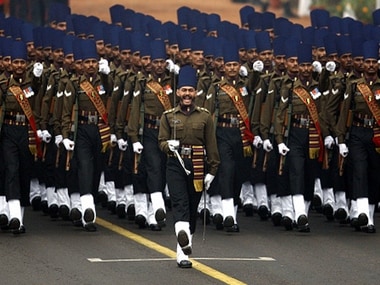The Central Board of Direct Taxes’ (CBDT) 24 June circular bringing disability pension under the tax scanner is the latest bone of contention between retired armed forces personnel and the government. The circular, without specifying the date from which the rule will be brought into effect, said that tax exemption for disability pension will be “available only to armed forces personnel who have been invalidated from service on account of bodily disability attributable to or aggravated by such service and not to personnel who have been retired on superannuation or otherwise”. While an Income Tax official told The Print that the rule always existed and the circular only seeks to provide clarification, servicemen have maintained that the new move is like rubbing salt into the wounds of those who suffered disability while serving the nation. [caption id=“attachment_5611281” align=“alignleft” width=“380”]  Representational image. Getty images[/caption] In January 2019, the defence ministry had tweeted, “With approval from Smt @nsitharaman, it has been decided that the disability/war injury pension, special family pension and liberalised family pension shall be minimum Rs 18,000 per month for Defence Forces pensioners/family pensioners, with effect from 1/1/2016.” The order, which did not specify the taxability of the amount, was a culmination of a decision taken after criticism of a slab-based disability pension suggested by the Seventh Pay Commission in September last year. Opposition parties and servicemen had criticised the system over the confusion over criteria to be used to determine the disability pension slab. Following the additional issue of the system causing an incongruity between the pension given to civilian and military employees, the defence ministry had referred the matter to the Anomaly Committee and suggested the minimum monthly Rs 18,000 pension amount. Armed forces personnel who suffer any kind of disability due to their service receive a separate disability pension, the amount of which depends on their rank and the kind of disability. Under the current pension scheme, a colonel-rank officer retiring after full service would get a pension of about Rs 1,02,000 per month. If the officer has been disabled during his service, he is graded on a percentage system by medical experts. “The rule for civilians as well as uniformed personnel is the same when it comes to disability pension: For 100 percent disability, 30 percent of pay becomes the disability pension. It is proportionately reduced for lesser percentage of disability,” a former officer told The Print. What further deepens the chasm between the defence personnel and the government is the latter’s treatment of appeals by the former servicemen concerning disability pension. As of October 2018, thousands of cases concerning disability pensions of ex-servicemen remained pending in different courts. An RTI reply revealed then that the government spent Rs 48 crores on fighting cases in the Supreme Court. This is in stark contrast to the BJP’s 2014 election manifesto promise to minimise appeals against Armed Forces Tribunal verdicts. An India Today cited instances of the statutory Court of Inquiry ruling soldiers’ disabilities as being attributable to service, and the verdict being refuted by the Defence Account Department. Former servicemen also accuse the government of denying them their claims based on indiscriminate appeals. In 2015, then defence minister Manohar Parrikar constituted a committee to reduce litigation and streamline the grievance redressal system. The committee found that the Ministry of Defence undertook litigations “compulsively, unethically and by way of administrative egotism”. It had recommended that all appeals pending against disabled soldiers filed in the Supreme Court be withdrawn immediately. In February this year, the Supreme Court expressed anguish over the Ministry of Defence’s appeals against verdicts favouring disabled soldiers and suggested it to “change its bureaucratic psyche”. The ministry then not only withdrew its appeals, but also decided to concede the cases filed by aggrieved litigants in the apex court on a case-to-case basis. The government, in its defence, can cite cases of officers misusing the scheme, the most recent one involving a Major general falsifying medical records to avail disability pension. In 2010, a former Army chief was a part of a row over obtaining a disability certificate stating that he suffered from hearing loss that qualified him for disability pension. The timing of the certificate, issued to him only a few days before his retirement, was at the centre of the row. The Seventh Central Pay Commission (CPC) had questioned the jump in disability pension cases, especially in senior ranks, after the previous pay panel had substantially hiked the payout for them. “But a few aberrations should not lead to such an illogical step to penalise everyone. There have been examples like Major General Ian Cardozo and Lt-Generals Vijay Oberoi and Pankaj Joshi, among others, who chose to carry on in service despite losing their legs and rose to high ranks,” a veteran told The Times Of India. The rule to grant tax exemption on disability pension only for those invalidated out of service due to the said disability overlooks the simple fact that most in the artillery or those who fly fighter planes suffer from hearing disabilities because of loud noise and spine problems because of “G-Force” acting on the body when flying respectively. Very few are compulsorily retired because of the disabilities they sustain during military service. In the current fiscal, the government has allocated over Rs 1 lakh crore for pension, which includes the One Rank One Pension scheme, touted to benefit nearly 25 lakh veterans. However, it must be noted that the troubles plaguing ex-servicemen have been doing the rounds in the Ministry of Defence corridors since at least Parrikar’s time, probably hinting that it is time that the new defence minister Rajnath Singh looks at transforming the attitude towards defence veterans.
The Central Board of Direct Taxes’ (CBDT) 24 June circular bringing disability pension under the tax scanner is the latest bone of contention between the retired Armed Forces personnel and the government
Advertisement
End of Article


)

)
)
)
)
)
)
)
)



